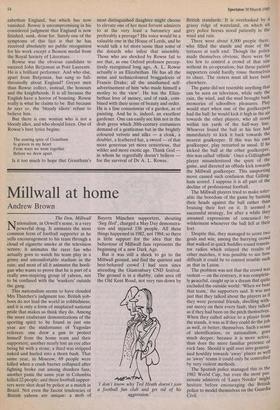Millwall at home
Andrew Brown
The Den, Mil!wall Nationalism, in Orwell's sense, is a very powerful drug. It animates the most common form of football supporter as he yells encouragement to his team through a cloud of cigarette smoke at the television screen; it animates the rarer fan who actually goes to watch his team play in a grimy and uncomfortable stadium in the rain; and most of all it animates the hooli- gan who wants to prove that he is part of a really awe-inspiring group 'of yahoos, not to be confused with the `wankers' outside the gang.
This nationalism seems to have clouded Mrs Thatcher's judgment too. British yob- boes do not lead the world in yobbishness; and it is only a form of misplaced national pride that makes us think they do. Among the more exuberant demonstrations of the sporting spirit to be found in just one year are the misfortunes of Yugoslav referees: one drew a gun to protect himself from the home team and their supporters; another nearly lost an eye after being hit with a stone; a third was stripped naked and hurled into a thorn bush. That same year, in Moscow, 69 people were killed when a crush barrier collapsed after fighting broke out among drunken fans; another panic the same year in Columbia killed 22 people; and three football suppor- ters were shot dead by police at a match in Brazil. Not even the fascist tendencies of British yahoos are unique: a mob of Bayern Miinchen supporters, shouting `Sieg Heil', charged a May Day demonstra- tion and injured 138 people. All these things happened in 1982, not 1984; so there is little support for the idea that the behaviour of Millwall fans represents the beginning of a new Dark Age.
But it was still a shock to go to the Millwall ground, and find the quietest and best-behaved crowd I had seen since attending the Glastonbury CND festival. The ground is in a shabby, calm area off the Old Kent Road, not very run-down by 7 don't know why Ted Heath doesn't join a football fan club and get rid of his aggression.' British standards. It is overlooked by a grassy ridge of wasteland, on which six grey police horses stood patiently in the wind and rain.
There were about 8,000 people there, who filled the stands and most of the terraces at each end. Though the police made themselves obvious, there were far too few to control a crowd of that size without its co-operation; but these patient supporters could hardly rouse themselves to cheer. The rioters must all have been elsewhere.
The game did not resemble anything that can be seen on television, while only the rain, the wind, and the mud brought back memories of schoolboy pleasures. Play would start when one of the goalkeepers had the ball: he would kick it high in the air towards the other players, who all stood within ten yards of the half-way line. Whoever found the ball at his feet had immediately to kick it back towards the nearest goalkeeper. If this was his own goalkeeper, play restarted as usual. If he kicked the ball at the other goalkeeper, this was called 'offside'. Once a Gillingham player misunderstood the spirit of the game, and directed an offside kick towards the ,Millwall goalkeeper. This unsporting move caused such confusion that Gilling- ham scored. I suppose it is all part of the decline of professional football. The Millwall players tried to make toler- able the boredom of the game by bashing their heads against the ball rather than bruising their feet on it. It seemed a successful strategy, for after a while they assumed expressions of concussed be- wilderment whenever the ball fell at their feet.
Despite this, they managed to score two goals and win; among the hurrying crowd that walked in quick huddles round transis- tor radios which relayed the results of other matches, it was possible to see how difficult it could be to control trouble such as that in Luton.
The problem was not that the crowd was violent — on the contrary, it was complete- ly peaceful, caught up in a dream that quite excluded the outside world: 'When we beat that team,' the supporters said. It was not just that they talked about the players as if they were personal friends, dwelling with- out mercy on their every fault; they talked as if they had been on the pitch themselves. When they called advice to a player from the stands, it was as if they could do the job as well, or better, themselves. Such a sense of identification, or nationalism, goes much deeper, because it is more active, than does the more familiar pretence of rock fans. Should it spill over into general- ised hostility towards 'away' places as well as 'away' teams it could only be controlled by very violent methods. The Spanish police managed this in the 1982 World Cup, but even the most pas- sionate admirers of 'Laura Norder' might hesitate before encouraging the British police to model themselves on the Guardia Civil.














































 Previous page
Previous page